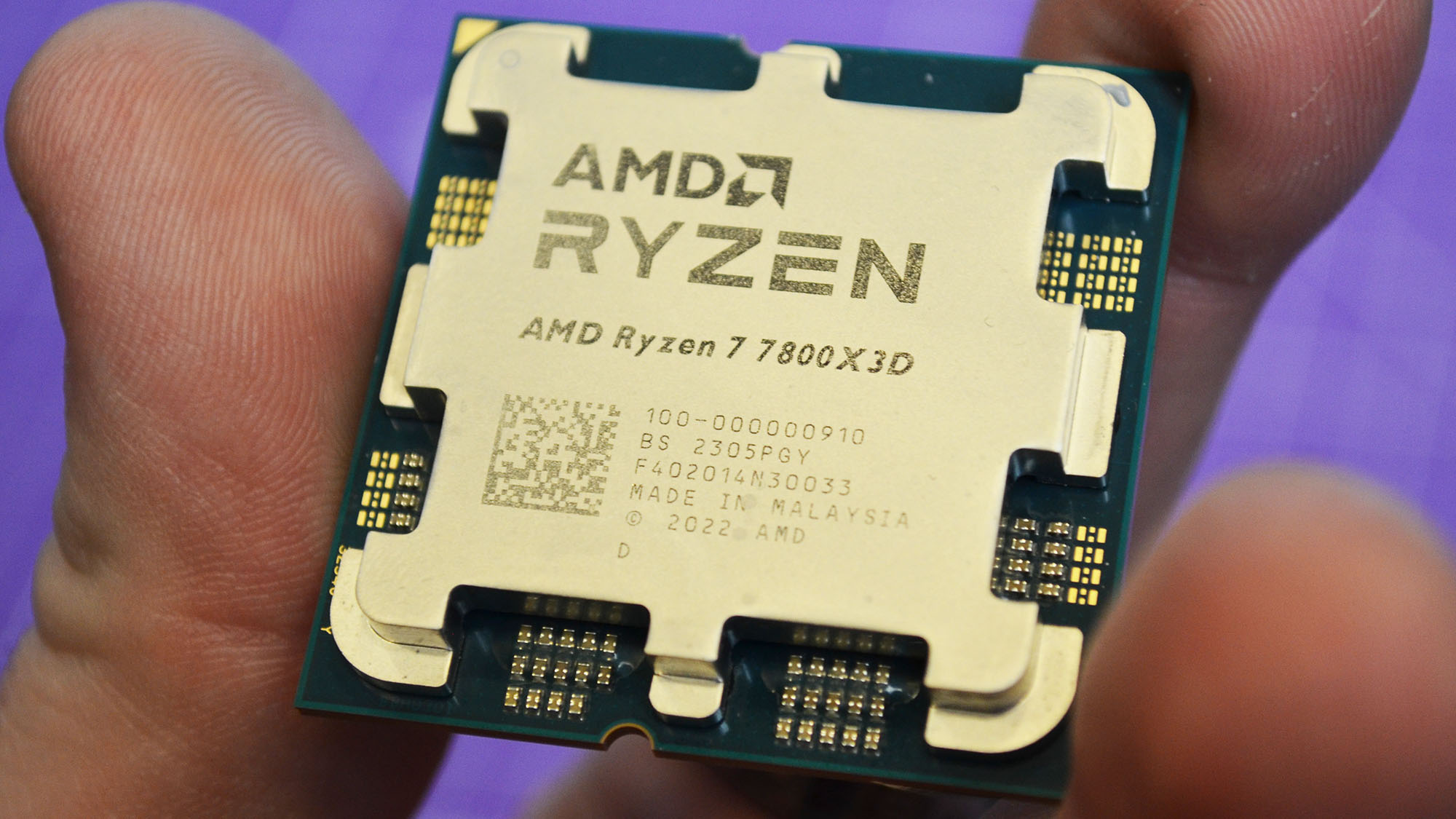
AMD Ryzen 7 7800X3D: Two-minute review
The AMD Ryzen 7 7800X3D has some tough shoes to fill after the much-acclaimed 5800X3D launched last year and took the PC gaming scene by storm, but fortunately for everyone involved, it is more than just a next-gen refresh.
The 7800X3D is one of the most potent gaming chips I've ever tested, easily beating out Team Blue's best processor, the Intel Core i9-13900K, across a number of titles despite having fewer cores and a slower boost clock. It even comes pretty damn close to putting up the kinds of fps I saw in my AMD Ryzen 9 7950X3D review, which is an even more impressive feat given how much more 3D V-Cache the 7950X3D has, in addition to twice the number of processing cores and higher clock speeds.
Even more impressive is how much performance the 7800X3D is able to squeeze out of a rather shockingly low amount of power, making this possibly the most energy efficient chip I've tested out of this latest generation of processors.
Add all this to a more acceptable price point of $469 (about £390 / AU$675) and you have the best AMD processor for a low-power midrange build for absolutely chewing through 1080p and even 1440p gaming. So much so, in fact, that you can completely disregard even the best Intel processors as a complete non-factor in this regard.
There are limits to what 3D V-Cache can do though, and once you push your graphics settings into the high-to-ultra range — especially at 4K resolution — the advantage of 3D V-Cache all but disappears as even the best graphics card struggles to keep up. So if you're out here in these streets trying to game at 4K with the max settings allowed, you're likely not going to see a whole lot of improvement over something like the AMD Ryzen 7 7700X or even the 5800X3D.
The other major drawback for this chip is that the 3D V-Cache seems to come at the cost of performance elsewhere, with the Ryzen 7 7800X3D lagging behind the Ryzen 7 7700X in just about every other performance category besides gaming. If you need a processor that can game hard while also being a productivity champ, you're going to have to invest more and get yourself one of the Ryzen 9 3D V-cache alternatives.
If you are on a more limited budget and can't go for one of the more expensive chips, then you're going to have to decide which is more important: gaming, or everything else. If you choose gaming though, you won't be disappointed with the AMD Ryzen 7 7800X3D.
AMD Ryzen 7 7800X3D: Price & availability
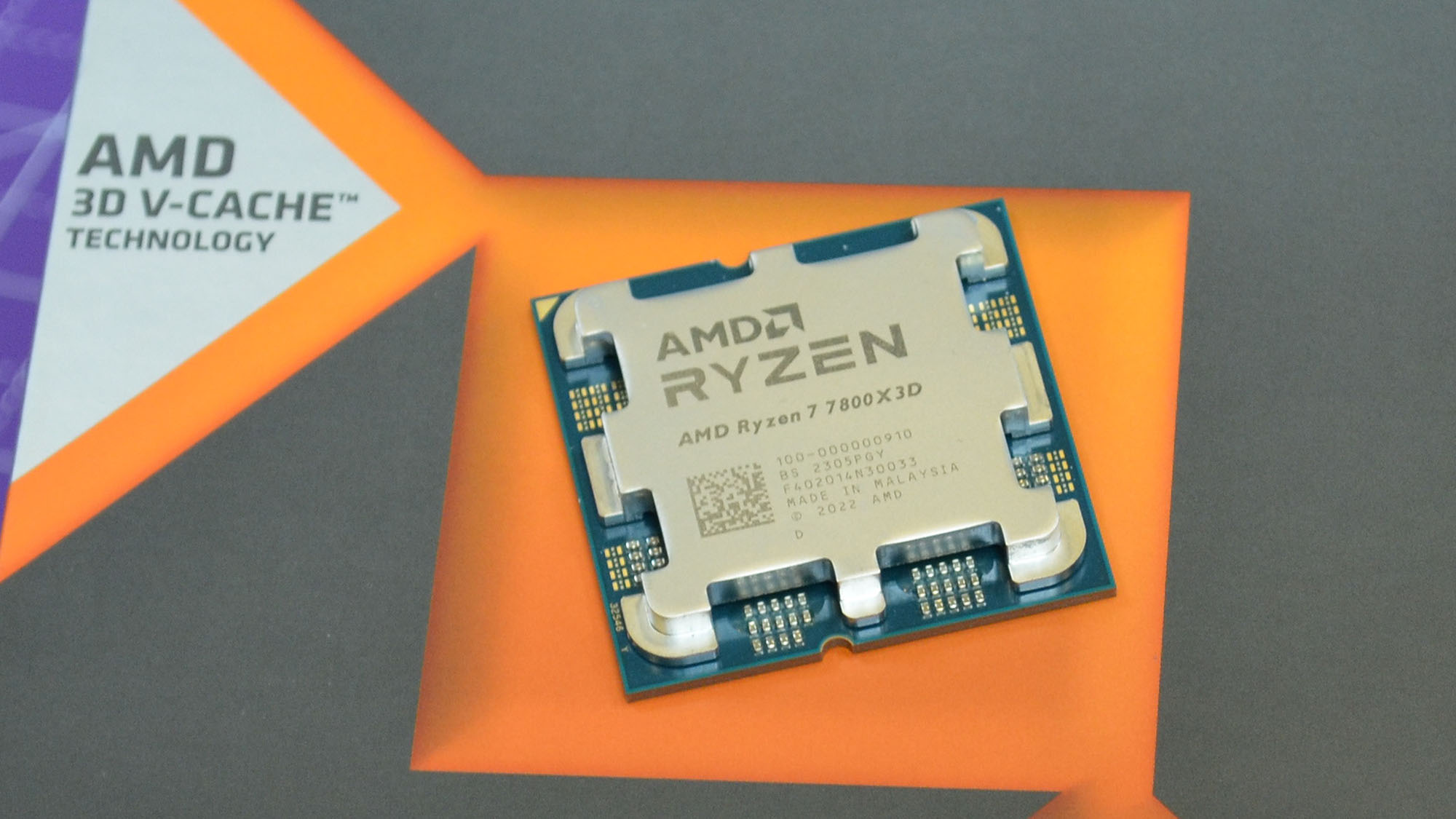
- $469 US MSRP (about £390 / AU$675)
- Available April 6, 2023
The AMD Ryzen 7 7800X3D is available as of April 6, 2023, with a US MSRP of $469, which converts to about £390 / AU$675, though I haven't been told official UK or Australia pricing as of yet. I have reached out to AMD for that info, and will update this review if I hear back from the company.
Of this latest class of 3D V-Cache chips, the Ryzen 7 7800X3D is the cheapest, with the Ryzen 9 7950X3D retailing for $699 (about £595 / AU$1,015) and the Ryzen 9 7900X3D retailing for $599 (about £510 / AU$870).
This also puts the Ryzen 7 7800X3D about 20% cheaper than the Intel Core i9-13900K ($589, about £500 / AU$850), and about 12% more expensive than the Core i7-13700K ($419, about £360 / AU$610) it is ostensibly competing against.
Like all AMD Zen 4 chips, though, this one will require you to upgrade to the AM5 platform, so you'll need a new motherboard if you don't already have a Zen 4 Ryzen 7000-series setup. You'll also need new DDR5 RAM, so this could be a more expensive upgrade than just the chip itself. That said, the same is pretty much true about Intel Alder Lake and Raptor Lake, so if you're upgrading from an 11000-series Intel chip or older, you're going to be paying a lot of money to make the upgrade either way.
And while this chip is slightly more expensive than the AMD Ryzen 7 5800X3D was when it launched, the price inflation isn't the worst I've seen, so I won't complain too much on that front.
- Price score: 4 / 5
AMD Ryzen 7 7800X3D: Chipset & features
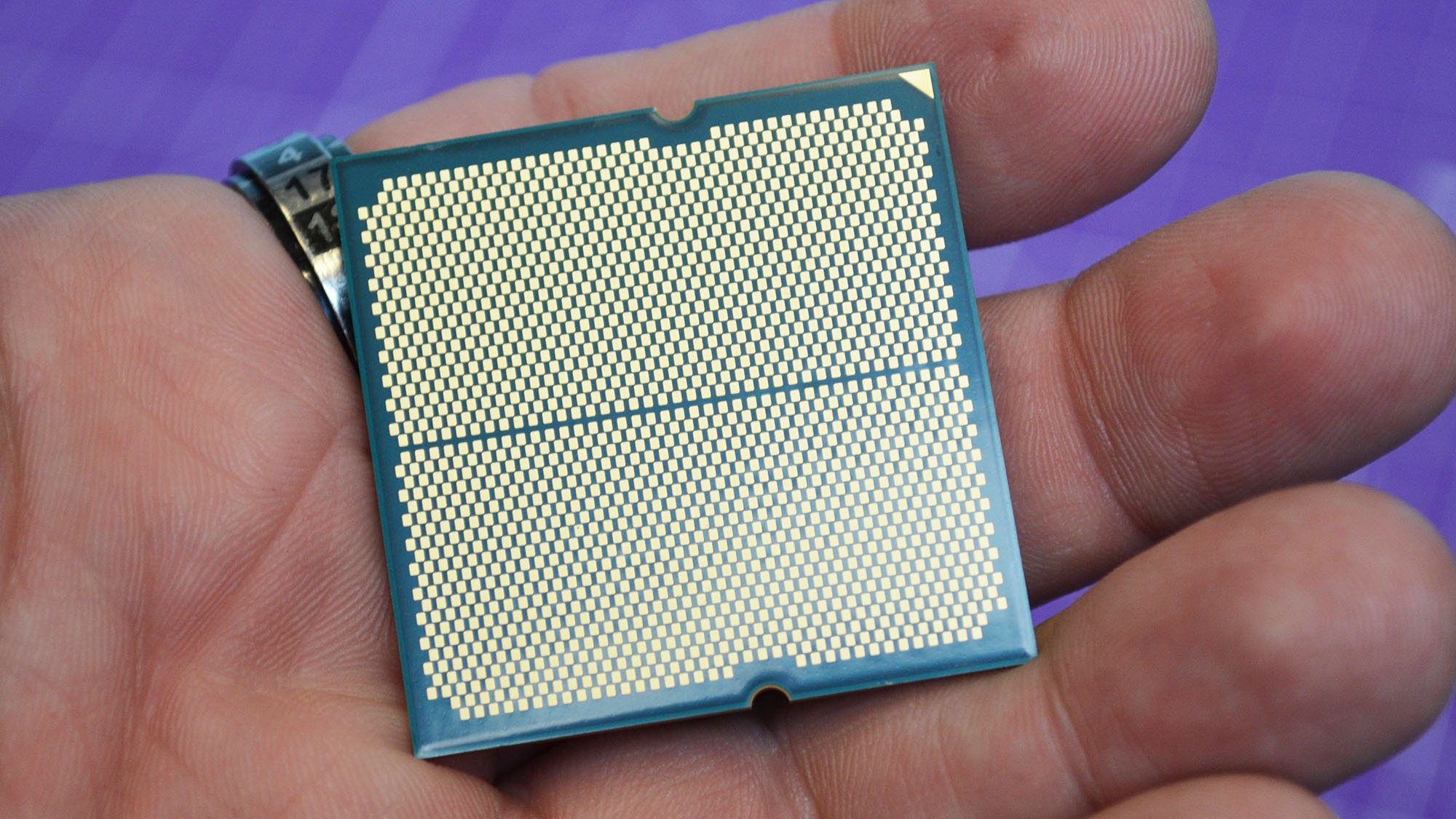
- 104MB 3D V-Cache
- Single CCD stacked cache
- Lower clock frequencies than Ryzen 7 7700X
The AMD Ryzen 7 7800X3D features the same stacked V-Cache as the 7900X3D and 7950X3D that were released at the end of February, which means that on top of the processor die itself, the 7800X3d contains an extra slab of silicon that adds an additional 64MB L3 cache memory to the 40MB already present, as found in the Ryzen 7 7700X.
Unlike the 7950X3D I tested, though, the 7800X3D does not split its compute die into two processing modules (CCDs). In the case of the 7950X3D, this split allows half of the 7950X3D's processing cores to have access to the new 3D V-Cache at the cost of clock frequency, while the other half of its processing cores do not have access to the V-Cache, but they have the full clock frequencies for the Zen 4 cores.
AMD's chipset driver manages which cores are best suited for specific tasks so games that benefit from V-Cache, for instance, get put on V-Cache cores while other apps would get thrown onto the full frequency cores.
Unfortunately, this does not apply to the 7800X3D, which only has eight V-Cache-accessing cores. This translates into a lower 4.20GHz base frequency, compared to the 4.5GHz of both the 7950X3D and 7700X, and a boost frequncy of just 5.0GHz, compared to 5.7GHz and 5.4GHz for the 7950X3D and 7700X, respectively. This is also slower than the top speed of the Core i7-13700K, which boosts up to 5.40GHz from 3.40GHz base frequency.
I wish I could say you don't notice the difference, but you do, though it isn't too egregious and the tradeoff for the extra gaming performance more than makes up for the slower clock speeds.
As for power usage, officially the 7800X3D has a TDP of 120W, but it didn't even come close to this in my testing, often using a full third less power than it's rated for. Once official drivers get updated after this chip launches, I expect there to be more utilization of the available power potential, but it might not be much more and honestly, it doesn't need it. It gets phenomenal performance for significantly less power than competing chips, so why mess with a great thing?
Finally, the 7800X3D can be overclocked to a limited degree in AMD's Ryzen Master software, but that's it. Trying to manually overclock the chip by setting a voltage or target frequency is a great way to fry your chip to a permanent end, and for $469, it's simply not worth it to try and experiment here.
- Chipset & features score: 4 / 5
AMD Ryzen 7 7800X3D: Performance
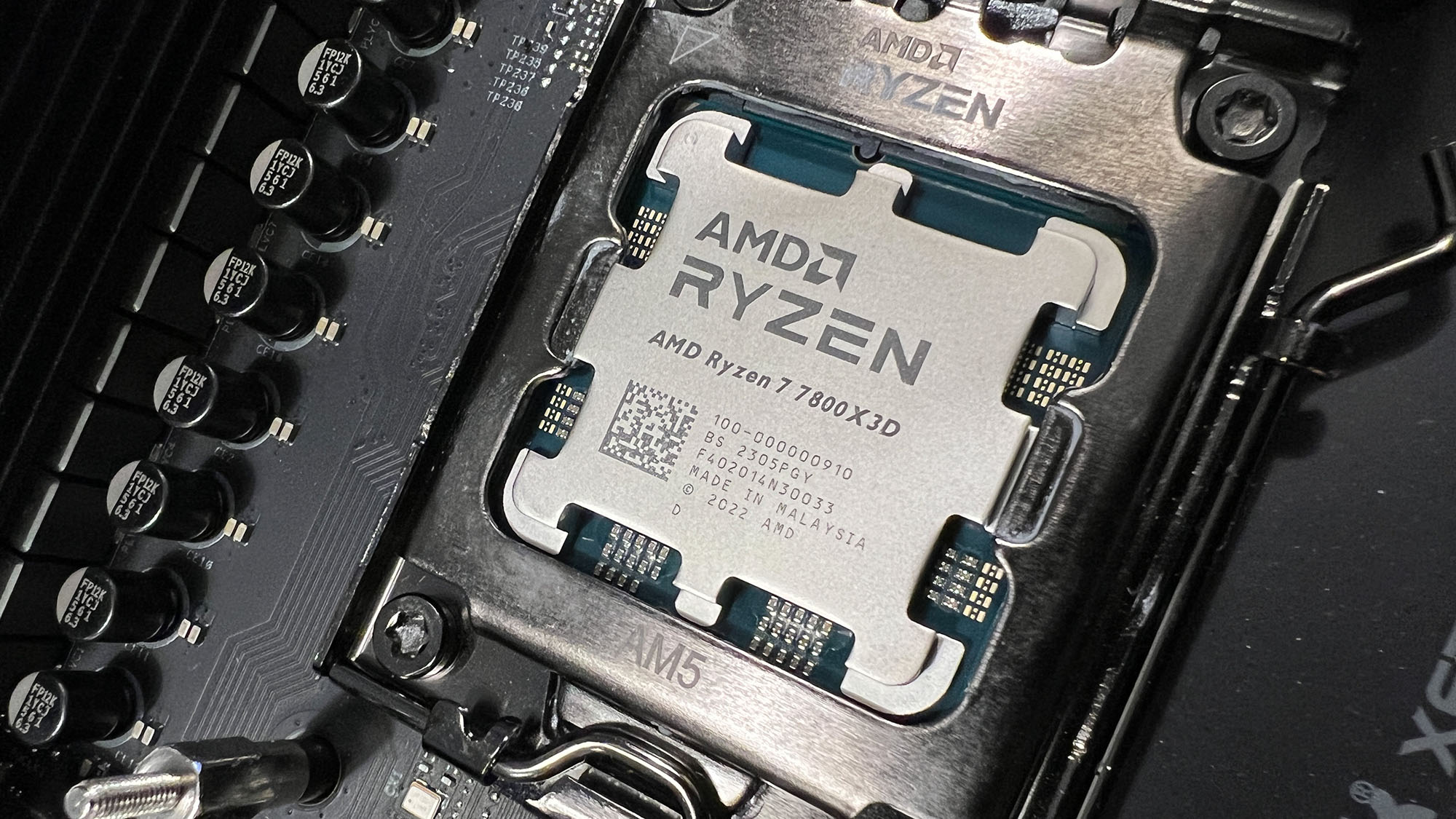
- Outstanding gaming performance
- Incredibly energy efficient
- Non-gaming performance lags, as does high-end gaming performance
When it comes to actual performance, there are few chips that are going to match the AMD Ryzen 7 7800X3D's gaming performance, though it is more easily eclipsed elsewhere.
Against the Ryzen 7 5800X3D, the Ryzen 7 7800X3D gets substantially better single core and multi core performance, improving over the previous generation by about 12% to 29% in synthetic benchmarks.
Against the competition, though, the 7800X3D definitely lags behind, sometimes by a large margin. Against Intel's Core i7-13700K, the Ryzen 7 7800X3D can be as much as 41.48% slower, though in fairness, the i7-13700K does have more cores to work with in these benchmarks. Still, for a cheaper processor, the i7-13700K is going to be the much better bet if productivity and non-gaming tasks is your primary workloads of concern.
When it comes to its nearest AMD sibling, the Ryzen 7 7800X3D doesn't fare too badly, but it does lag behind regardless. Against the Ryzen 7 7700X, the 7800X3D is about 4% to 10% slower across the board. Considering that the 7800X3D is more expensive, if you're looking for a productivity or non-gaming chip, go with the 7700X over the 7800X3D.
On the creative side of things, the 7800X3D likewise makes some pretty substantial gains over its predecessor, getting between 13% and 32% better performance on creative workloads like 3D rendering or video encoding.
The Ryzen 7 7800X3D falls short of the Intel Core i7-13700K on creative benchmarks, unfortunately, performing anwhere from 9% to nearly 30% slower than Intel's midrange performance processor. This isn't unexpected, as those extra cores and higher clock speeds definitely give Intel a leg up here.
No surprise here, the 7700X slightly edges out the 7800X3D in creative performance as well, with the 7800X3D coming in about 3% to 6% slower than its eight-core, non-3D V-Cache counterpart.
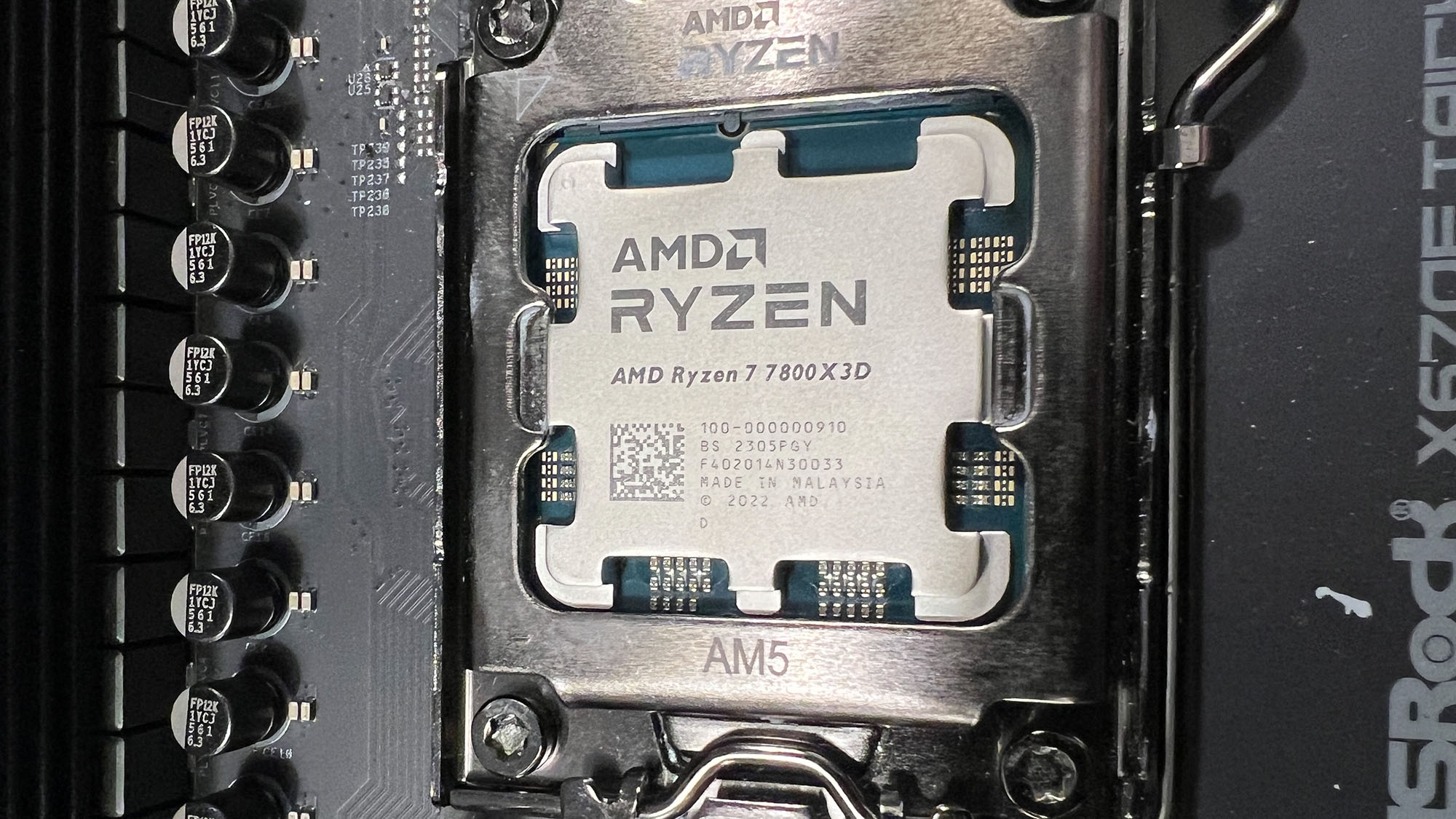
It might look like the AMD Ryzen 7 7800X3D is on the ropes at this point against it's in-generation rivals, but gaming performance is where things really turn around for the 7800X3D, and in a very big way.
Pairing the 7800X3D against the 7950X3D, the 7800X3D manages to come very close to matching the 7950X3D's gaming performance across a range of titles. At 1080p on its lowest settings, the 7800X3D is only 18.15% slower than the 7950X3D on average while playing Returnal, but only 2.7% slower while playing Counterstrike: Global Offensive at its lowest settings at 1080p. In the case of CS:GO, that is actually a very common way to play the game in order to maximize your frame rate, with in both cases reaches nearly 900 fps.
Matching the Ryzen 7 7800X3D up against the formidable Intel Core i9-13900K, and you get a lower-tier processor that can get as many as 281 more fps in CS:GO, making the 7800X3D a very compelling chip for esports players on a more limited budget.
The 7800X3D's worst performance against the 13900K was Returnal, where it averaged about 12.5% fewer fps, while still managing an impressive score of 224 fps. Meanwhile, the 7800X3D battled the 13900K to a technical decision in Total War: Warhammer III (552 fps for the 7800X3D to the 13900K's 594 fps), while handily beating the more powerful processor in F1 2022 and Tiny Tina's Wonderland.
Altogether, the Ryzen 7 7800X3D got an average of 537 fps compared to the i9-13900K's 463 average fps, or about 16% more fps overall. Not too shabby, especially considering that the Ryzen 7 7800X3D also averaged a minimum of about 356 fps to the i9-13900K's 312 minimum fps average, or about 14% faster when it comes to consistent game performance.
Of course, all of this goes to pot the second you crank up the graphics settings to highest they'll go at 4K, with every game I tested it with GPU locking at roughly the same framerate on a game by game basis. The 7950X3D managed to score a couple of wins on this metric, but only on a couple of games and only by a couple dozen fps or so.
The 7800X3D, meanwhile, pretty much runs even with the i9-13900K at 4K, ultra settings, across the board.
The most amazing thing about the gaming performance of the Ryzen 7 7800X3D, honestly, is its efficiency. All of the scores I got from my testing never pushed more than 80W of power through the chip, and at less than 80 degrees Celsius, you won't need a beast of a cooling solution for this processor.
You can tinker with the performance profile to a degree in the Ryzen Master utility if you need to eek out some extra non-gaming performance, but how effective that will be will take a lot more testing on my part than I have time for in this review. Personally, I wouldn't even want to push it further than where its at, since the prospect of a processor running under 100W paired with a newer GPU running less than 200W has me seeing mini gaming PC builds dancing through my head.
If you want brute force, raw power and performance, by all means, jump on the Ryzen 9 7950X3D or Core i9-13900K. Those chips will give you all that and more, but if you're looking for a low-profile, low-power gaming PC build that doesn't suck, AMD has made exactly the processor you've been looking for, and while it's not cheap, as a value proposition, it really can't be beat as a gaming processor.
- Performance: 4.5 / 5
Should you buy the AMD Ryzen 7 7800X3D?

Buy it if...
Don't buy it if...
Also Consider
If my AMD Ryzen 7 7800X3D review has you considering other options, here are two processors to consider...
How I tested the AMD Ryzen 7 7800X3D
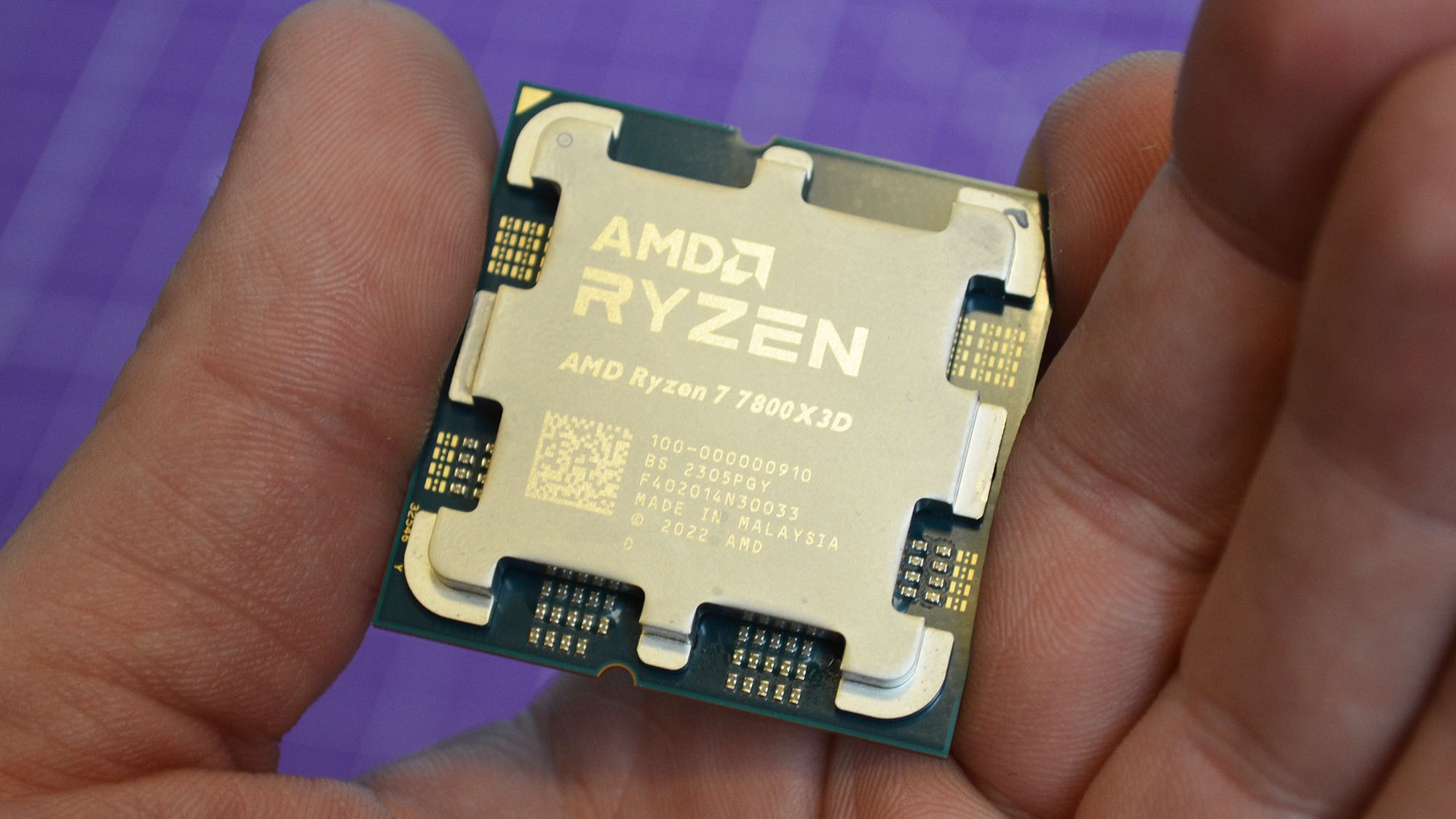
- I spent nearly two weeks testing the AMD Ryzen 9 7800X3D
- I ran comparable benchmarks between this chip and competing processors
- I gamed with this chip extensively
In order to test the Ryzen 7 7800X3D, I benchmarked it for roughly two weeks, running various synthetic tests on it as well as real world workloads, along with competing processors to gather comparable scores. I made sure to use the same hardware wherever possible to ensure that the most direct comparisons can be made.
In addition to synthetic tests, I used this processor as my main gaming chip for a few days to informally measure real world performance, while noting any games where performance was particularly exceptional in either direction.
Finally, I took all of the datapoints I'd gathered and compared the average scores of each processor tested for this review against its retail price, current as of this review, to measure how good of a value this processor is or isn't.
First reviewed April 2023







